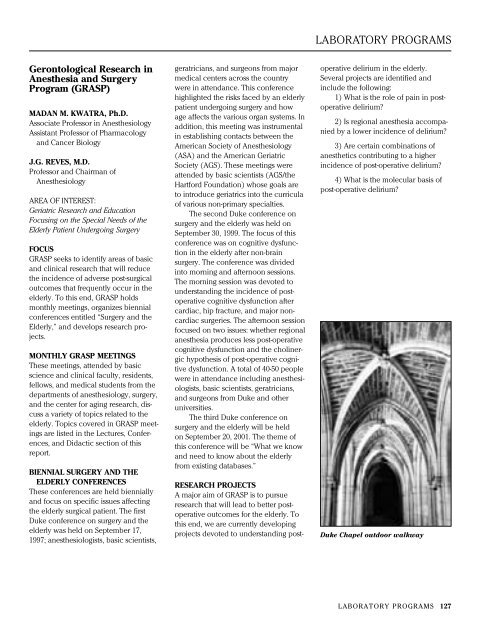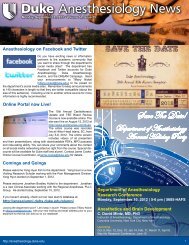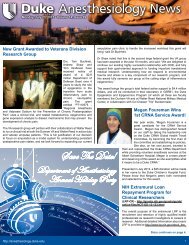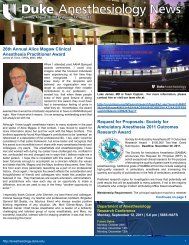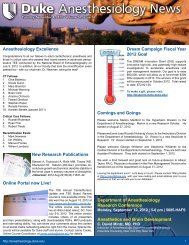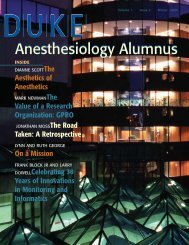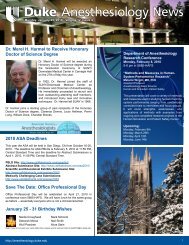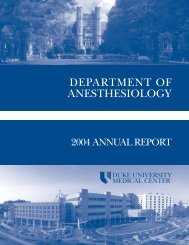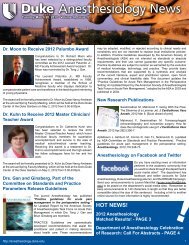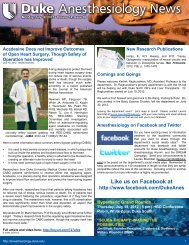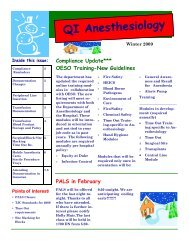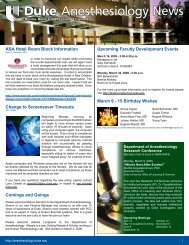DEPARTMENT OF ANESTHESIOLOGY ANNUAL REPORT
DEPARTMENT OF ANESTHESIOLOGY ANNUAL REPORT
DEPARTMENT OF ANESTHESIOLOGY ANNUAL REPORT
You also want an ePaper? Increase the reach of your titles
YUMPU automatically turns print PDFs into web optimized ePapers that Google loves.
Gerontological Research in<br />
Anesthesia and Surgery<br />
Program (GRASP)<br />
MADAN M. KWATRA, Ph.D.<br />
Associate Professor in Anesthesiology<br />
Assistant Professor of Pharmacology<br />
and Cancer Biology<br />
J.G. REVES, M.D.<br />
Professor and Chairman of<br />
Anesthesiology<br />
AREA <strong>OF</strong> INTEREST:<br />
Geriatric Research and Education<br />
Focusing on the Special Needs of the<br />
Elderly Patient Undergoing Surgery<br />
FOCUS<br />
GRASP seeks to identify areas of basic<br />
and clinical research that will reduce<br />
the incidence of adverse post-surgical<br />
outcomes that frequently occur in the<br />
elderly. To this end, GRASP holds<br />
monthly meetings, organizes biennial<br />
conferences entitled “Surgery and the<br />
Elderly,” and develops research projects.<br />
MONTHLY GRASP MEETINGS<br />
These meetings, attended by basic<br />
science and clinical faculty, residents,<br />
fellows, and medical students from the<br />
departments of anesthesiology, surgery,<br />
and the center for aging research, discuss<br />
a variety of topics related to the<br />
elderly. Topics covered in GRASP meetings<br />
are listed in the Lectures, Conferences,<br />
and Didactic section of this<br />
report.<br />
BIENNIAL SURGERY AND THE<br />
ELDERLY CONFERENCES<br />
These conferences are held biennially<br />
and focus on specific issues affecting<br />
the elderly surgical patient. The first<br />
Duke conference on surgery and the<br />
elderly was held on September 17,<br />
1997; anesthesiologists, basic scientists,<br />
geratricians, and surgeons from major<br />
medical centers across the country<br />
were in attendance. This conference<br />
highlighted the risks faced by an elderly<br />
patient undergoing surgery and how<br />
age affects the various organ systems. In<br />
addition, this meeting was instrumental<br />
in establishing contacts between the<br />
American Society of Anesthesiology<br />
(ASA) and the American Geriatric<br />
Society (AGS). These meetings were<br />
attended by basic scientists (AGS/the<br />
Hartford Foundation) whose goals are<br />
to introduce geriatrics into the curricula<br />
of various non-primary specialties.<br />
The second Duke conference on<br />
surgery and the elderly was held on<br />
September 30, 1999. The focus of this<br />
conference was on cognitive dysfunction<br />
in the elderly after non-brain<br />
surgery. The conference was divided<br />
into morning and afternoon sessions.<br />
The morning session was devoted to<br />
understanding the incidence of postoperative<br />
cognitive dysfunction after<br />
cardiac, hip fracture, and major noncardiac<br />
surgeries. The afternoon session<br />
focused on two issues: whether regional<br />
anesthesia produces less post-operative<br />
cognitive dysfunction and the cholinergic<br />
hypothesis of post-operative cognitive<br />
dysfunction. A total of 40-50 people<br />
were in attendance including anesthesiologists,<br />
basic scientists, geratricians,<br />
and surgeons from Duke and other<br />
universities.<br />
The third Duke conference on<br />
surgery and the elderly will be held<br />
on September 20, 2001. The theme of<br />
this conference will be “What we know<br />
and need to know about the elderly<br />
from existing databases.”<br />
RESEARCH PROJECTS<br />
A major aim of GRASP is to pursue<br />
research that will lead to better postoperative<br />
outcomes for the elderly. To<br />
this end, we are currently developing<br />
projects devoted to understanding post-<br />
LABORATORY PROGRAMS<br />
operative delirium in the elderly.<br />
Several projects are identified and<br />
include the following:<br />
1) What is the role of pain in postoperative<br />
delirium?<br />
2) Is regional anesthesia accompanied<br />
by a lower incidence of delirium?<br />
3) Are certain combinations of<br />
anesthetics contributing to a higher<br />
incidence of post-operative delirium?<br />
4) What is the molecular basis of<br />
post-operative delirium?<br />
Duke Chapel outdoor walkway<br />
LABORATORY PROGRAMS 127


